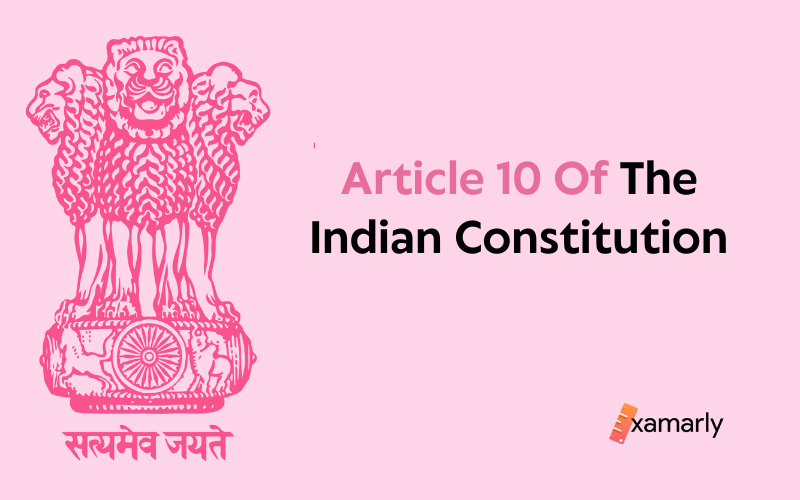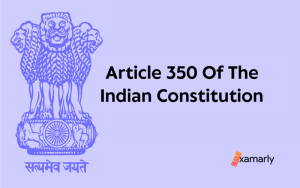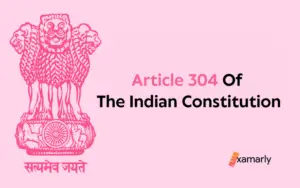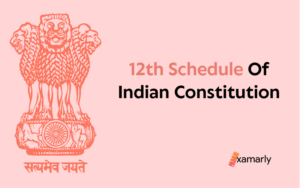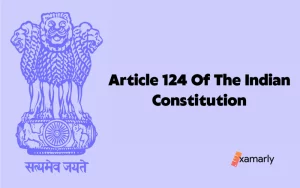Under the constitution of India, people declared citizens by the preceding citizenship articles continued to be subject to any laws passed by the Parliament. This was according to Article 10 of the Indian Constitution. One member proposed to eliminate this article because he felt it was superfluous and unnecessary and that Draft Article 6 (Article 11) was sufficient for these reasons, despite the fact that there were no significant discussions surrounding it.
The Articles on Citizenship for people are just temporary, the Chairman of the Drafting Committee emphasized. And comprehensive citizenship legislation would be enacted by the future Parliament. On August 12, 1949, the Assembly approved this article without making any changes.
The following article describes various other details about Article 10 of the Indian constitution.
Article 10: Continuance of the Rights of Citizenship
Article 10 of the Indian Constitution addresses the continuance of citizenship rights. It is about every person who is or is deemed to be an Indian citizen under any of the aforementioned provisions of Part II. It shall remain an Indian citizen, subject to the provisions of any laws that may be made by Parliament.
What Is Citizenship In India?
The term “citizenship” denotes the connection between a person and their country. India has citizens and foreigners, much like any other contemporary state. The Indian State is their loyalty, and citizens are full members of it. They have access to every civil and political right. Since citizenship excludes non-citizens, it is a notion of exclusion.
Two established rules govern the award of citizenship:
- Jus sanguinis recognizes blood links, whereas “jus soli” grant citizenship based on place of birth.
- The Indian government has supported the progressive idea of jus soli since the Motilal Nehru Committee (1928).
- The Constituent Assembly also disapproved of the racial notion of jus sanguinis because it went against the ethos of India.
The legal place of a person as a legitimate citizen of a state or as a member of a country is known as citizenship. The Indian Constitution’s Articles 5 through 11 deal with citizenship. In order to fully enjoy any State in which a member has civil and political privileges, one must be a resident of that State.
To learn more about Articles 5 to 11, check out the linked article from the table given below.
10 Additional Information On Citizenship In India
- Articles 5 through 11 (Part II) of the Indian Constitution govern the conferral of citizenship to an individual.
- In addition to the aforementioned Articles of the Indian Constitution, the 1955 Citizenship Act, which was established by the Indian Parliament, has a significant bearing on citizenship.
- After the Constitution’s inception, there was a keen discussion about India’s citizenship. It was in the Citizenship Act of 1955. It is a law that regulates how Indian citizenship is obtained and lost.
- The Citizenship Act of 1955 is amended by-
- the Citizenship (Amendment) Act of 1986,
- the Citizenship (Amendment) Act of 1992,
- the Citizenship (Amendment) Act of 2003,
- the Citizenship (Amendment) Act of 2005, and
- the Citizenship (Amendment) Act of 2016, as the relevant law.
- Obtaining Indian citizenship in accordance with the Citizenship Act of 1955: You can become an Indian citizen in the following ways: (1) Citizenship at the time the Indian Constitution took effect (2) Citizenship by birth: This provision contains various clauses for various time periods.
- Citizenship by registration, citizenship by descent, and citizenship by naturalization are the other options.
- According to the Citizenship Act of 1955, Indian citizenship can be revoked: There are three ways for the termination of citizenship in India: renunciation, termination, and deprivation.
The relevant sections of the Indian Constitution went into effect on November 26, 1949, and anyone residing on Indian territory at that time automatically became a citizen of India. (Citizenship at the start of India’s constitution). - A citizen of India by birth is somebody who was born in India on or after January 26, 1950, but prior to the 1986 Act went into consequence on July 1, 1987. [Native citizenship]
- If either parent was an Indian citizen at the time of the child’s birth and the child was born in India on or after 1 July 1987, the child is an Indian citizen. [Native citizenship]
- A person is only considered an Indian citizen if both of their parents are Indian citizens, or if one parent is an Indian citizen and the other was not an illegal immigrant at the time of the child’s birth. This rule applies to all children born in India on or after 3 December 2004. [Native citizenship].
- Contrary to jus soli, the majority of Indian nationality law is based on-
- jus soli (citizenship by right of blood) (citizenship by right of birth within the territory).
- According to Article 9, an individual who preferably acquires citizenship of any other country loses their Indian citizenship. Additionally, a person must renounce their Indian passport if they obtain citizenship in another nation. Failing to do so is a criminal violation under the Passports Act.
- An individual of Indian roots must be a resident of any nation, excluding Sri Lanka, Bhutan, Pakistan, Bangladesh, Afghanistan, China, and Nepal, in order to apply for a Persons of Indian Origin (PIO) Card.
- They must also have held an Indian passport at some point in the past, or they must be the spouse of an Indian citizen or a Person of Indian Origin. Foreign persons who fulfilled the prerequisites to become Indian citizens on or after 26.01.1950 or who were Indian citizens at that time may apply for OCI Cards. Applications from citizens of Bangladesh and Pakistan will not be considered.
- Overseas Indian Card: The Citizenship (Amendment) Bill is a new bill that is presently before Parliament. It aims to replace the current Person of Indian Origin (PIO) and Overseas Citizen of India (OCI) cards with a new Overseas Indian Card.
- The OCI card is multiple entries (multi-purpose lifetime visa) for visiting India. While PIO cardholders do not need a separate visa and are permitted multiple visits for 15 years. In terms of economic, financial, and educational considerations, OCI cardholders are on an even footing with non-resident Indians, with the exception of the ability to own agricultural land.
- If a PIO cardholder plans to stay in India (for more than 180 days in a single visit)-
- they must register with the local police authorities
- Dual citizenship is not OCI. OCI card holders are not allowed to vote.
- The term “first Citizen of India” refers to the Indian president.
The Difference Between Article 10 And Article 11 Of The Indian Constitution
According to Article 10, unless Parliament passes a law removing the person’s citizenship, everyone meeting the criteria for citizenship under Part 2 of the constitution will become or remain a citizen.
According to Article 11, there are no constitutional restrictions on the laws that Parliament may enact regulating who is and is not a citizen, why or how, or both.
Because it preserved continuity from a period before the constitution was adopted, the first is essential. The second is essential as it guarantees that Parliament can continue to oversee citizenships after that.
Conclusion
To conclude the details of Article 10 of the Indian Constitution, we can say that it focuses on the continuance of the rights of citizenship. There is a statement subject to the requirements of any laws that may be adopted by Parliament, anyone, who is or is deemed to be an Indian citizen under any of the aforementioned provisions of this Part. They shall continue to be such an Indian citizen.
FAQs
What is Citizenship Amendment Bill 2019?
Six communities — Hindus, Christians, Sikhs, Parsis, Jains, and Buddhists — fleeing persecution in Pakistan, Afghanistan, and Bangladesh are to be granted Indian citizenship as a result of the Citizenship (Amendment) Bill. The bill modifies the Citizenship Act of 1955 to make certain categories of illegal immigrants eligible for citizenship.
In Which Part Of The Indian Constitution Article 10 Is Contained?
In Part II, article 10 of the Constitution of India is mentioned.
What Are The Types Of Citizenship In India?
This law outlines 5 ways to become a citizen:
1. By ancestry 2. Inherited 3. By registering; 4. By naturalization 5. By incorporating the land.
Does India Allow Dual Citizenship?
The constitution of India does not contain any language addressing multiple or dual citizenships. An Indian can instead get a second passport from another nation. But they must forfeit their Indian citizenship.
What Is Citizenship Act 1955?
This Act was introduced in 1935 with the intention of placing all authority under British rule and transferring authority to only a select group of officers with Indian ancestry.


